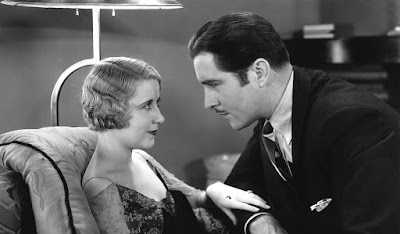 |
| Women of all Nations |
The early morning screening of Raoul Walsh’s Women of All Nations (USA, 1931) filled up the newly air-conditioned Jolly Cinema. Walsh’s return to the characters of Flagg and Quirt first seen in his 1926 What Price Glory is full of rollicking off-colour humour, and much use of double-entendres. A peripheral character exhibits much gay behaviour though is not pilloried for it in the way Walsh did in at least one other film from the period. Victor McLaglen is as crude and as loud as anyone could be in the pre-Code era.
Hardly anybody left when the lights came up and then the audience was joined by dozens more seeking seats for John Stahl’s Seed (1931) a film seemingly unknown even to the hardcore heavyweight cinephiles who could be spotted in the audience. For starters, Bernard Eisenschitz was one among the new entrants who took up a seat in our row. Then there was a terrific intro from scholar Imogen Sara Smith.
 |
| Seed |
In Seed, Bart Carter (John Boles) is labouring away as a bank clerk when his former flame Mildred (Genevieve Tobin) comes into the office. She’s a highflyer in the same company and he invites her home for dinner. There she meets Bart’s wife Peggy (Lois Wilson) and very boisterous five kids, the latter being the reason that Bart is chained to a dead end job instead of being the highly promising novelist that Mildred knew.
Mildred awakens Bart’s ambitions and in the end Bart’s wife walks with the kids leaving Bart to hook up with Mildred and become a writer once again. Cut to “Ten Years Later” and Bart finally re-establishes contact and promptly proceeds to entice the kids away from the straitened family circumstances. Promises of finishing schools and university win them all over and the wife is left lonely and bereft, her job as a mother done and no gratitude shown. A coda has the two wives meeting and the second saying that the kids will be back. We’re not at all sure that Peggy’s advice to her future daughter-in-law never to have children and inflict such misery on yourself remains. Tremendously touching and I think the applause at the end went on longer and stronger than for any other film of the week. Serious cinephiles were later already asking each other ‘Did you see Seed?
 |
| This Cant Happen Here |
At every one of Bologna’s iterations there is always one movie that people say made the show. I think it may be Seed this year. It certainly wont be GW Pabst’s Mysterious Shadows a complicated and leaden post-war melodrama and wont be Ingmar Bergman’s This Cant Happen Here/High Tension, a film suppressed first by the master himself and later by the Bergman family on the basis that Bergman’s attempt at a Cold War thriller clunks rather a lot. It has virtues and the anti-Soviet message was strong but the plot seemed too simple as it rolled along to a less than breathless conclusion. The fact that the audience, which included many of the same heavyweight cinephiles who again were all seeing the long-hidden film for the first time, started to trickle out, notwithstanding its very short 85 minutes, said a bit.
Raoul Walsh, John Stahl, GW Pabst, Ingmar Bergman (and a minor William Dieterle as well) made for quite a day.
Bergman of course is everywhere this year, celebrating his 100thbirthday. There were no doubt 5000+ in the Piazza Maggiore for a resto of The Seventh Seal last night and no doubt more than a few at a screening of Margarethe von Trotta’s new doco about the master. Von Trotta also did the Piazza intro.
No comments:
Post a Comment
Note: only a member of this blog may post a comment.